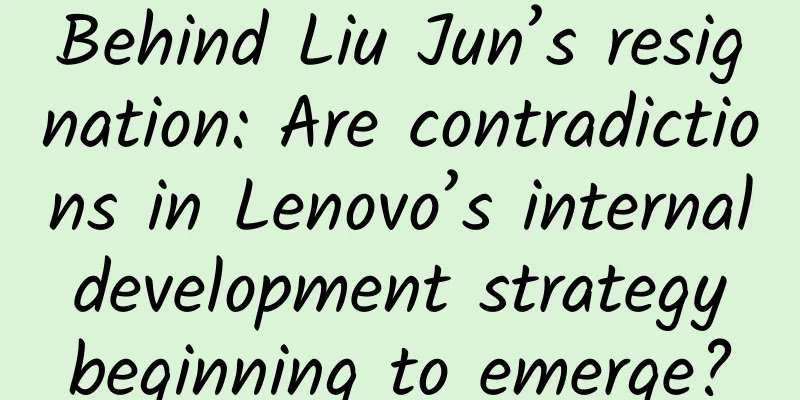Behind Liu Jun’s resignation: Are contradictions in Lenovo’s internal development strategy beginning to emerge?

|
Recently, Lenovo Group announced a personnel adjustment last night. Liu Jun, executive vice president of Lenovo Group, president of mobile business group and chairman of Motorola Mobility Management Committee, resigned. Chen Xudong will take over Liu Jun's position, effective immediately. At the same time, Chen Xudong will also serve as co-chairman of Magic Factory, and Chang Cheng, vice president of Magic Factory, will serve as CEO. I believe that most industry insiders (including us) were shocked when they saw this news. So far, most industry analysts believe that Liu Jun's resignation was due to the poor performance of his mobile department, especially the mobile phone business. On the surface, this is the case, but from a deeper analysis, we believe that Lenovo has had internal strategic differences since the beginning of the acquisition of Motorola Mobility, and it was only Liu Jun's resignation that finally brought these differences to the surface. To this day, we still don’t know who played a decisive role in the decision to acquire Motorola Mobility. Perhaps some people (including Lenovo itself) would say that this was a collective decision made by Lenovo’s board of directors. However, I wonder if the industry still remembers the acquisition that originated more than 10 years ago, that is, in 2005, Lenovo acquired IBM PCD (IBM’s PC business) for US$1.25 billion. According to the later recollections of Lenovo Holdings Chairman Liu Chuanzhi, at that time, Lenovo’s decision-makers (including Liu Chuanzhi himself) strongly opposed Yang Yuanqing’s proposal to acquire IBM PCD. It was only at the final decision-making moment that Yang Yuanqing’s arguments finally allowed the acquisition to pass. Therefore, in the history of Lenovo’s acquisitions, some high-level people still have considerable influence and voice. Therefore, we believe that there must have been internal disagreements when acquiring Motorola Mobility. After all, judging from the market performance of Motorola Mobility, the acquisition brought both huge opportunities and challenges to Lenovo Mobile and even the entire group's business development. So who was the one who advocated the acquisition of Motorola Mobility or played a decisive role in the acquisition? Judging from the subsequent appointment, it should be Liu Jun. Of course, judging from Yang Yuanqing's radical strategy (which had already been shown in the previous acquisition of IBM PCD), Yang Yuanqing was more inclined to support Liu Jun. Then the next question is the strategic positioning and market strategy of Motorola Mobility after the merger. Will it still follow the strategy of Motorola Mobility before the merger, which was to focus on overseas markets (mainly the mid-to-low-end market) and not enter the Chinese market, or will it rely on Motorola's almost exhausted brand influence in the Chinese market to enter some high-end markets while also taking into account the mid-to-low-end market? From the later results, Lenovo obviously chose the latter. However, market facts later proved that Lenovo's strategy was too optimistic. Not only did it fail to form a synergistic and complementary market effect with its own Lenovo brand mobile phones, its shipments did not increase but decreased. This strategy was amplified in the first quarter of this year, and Lenovo mobile phones fell out of the top three in the Chinese market. So the question is, who will make the final decision on the positioning and market strategy mentioned above, which is no less important than mergers and acquisitions? Perhaps the industry believes that it should be Liu Jun, after all, Liu Jun is in charge of the mobile phone business, but before Lenovo completed the acquisition of Motorola Mobility, Lenovo established the so-called magic factory and prepared to focus on Internet mobile phones. It was at this time that Chen Xudong, who was in charge of Lenovo's PC business, stood in the position of both ally and opponent with Liu Jun. Previously, under Chen Xudong's leadership, Lenovo's China PC business market share increased from 26% to 36%, and profits doubled. But after all, the PC business is already a super stable business for Lenovo, and there is not much room for future development (including related executives). At this time, the rapidly developing mobile Internet (such as smartphones) department naturally became a hot commodity. At the same time, Lenovo CEO Yang Yuanqing's requirements and attitude towards the acquisition of Motorola Mobility have also changed. For example, the profit expectation has been shortened from 10 quarters at the beginning of the acquisition to 4-6 quarters until the end of this year. I wonder what the industry has seen from these subtle changes? Our feeling is that Yang Yuanqing is putting pressure on Lenovo's mobile business by setting profit targets in advance and using the Magic Factory. Of course, we are not saying that Yang Yuanqing is targeting Liu Jun himself, but it is precisely this kind of pressure that makes us have to speculate that Motorola Mobility's return to the Chinese market was a helpless choice made by Liu Jun under heavy pressure. But as mentioned before, this strategy was obviously a mistake. And it was precisely because of the decline in mobile performance caused by the mistake that the previously established Magic Factory led by Chen Xudong was naturally rehabilitated and valued, although in our opinion, the difficulty and risk of the Magic Factory finding a foothold in the fiercely competitive mobile phone market in the future (including the development of overseas markets) is greater than Lenovo's integration of the acquired Motorola mobile business. Of course, if we take into account the operation of the Magic Factory at the capital level, that is another matter. In short, before and after the acquisition of Motorola Mobility, Lenovo's top management's mobile strategy and practices were always full of contradictions. Not only did they fail to form a unified strategy, but they also gave people a feeling of competition. In this case, Lenovo had no energy to innovate and develop business, and it was reasonable that its competitiveness and market share declined. But what worries us more is Liu Jun's resignation. Chen Xudong, who succeeded Liu Jun, already holds the power of Lenovo's three mobile phone brands. However, he said in an internal email that the new changes mean that Magic Factory will share resources and achieve synergy with Lenovo Group in more areas, and will help Magic to face a wider international market; this adjustment will also greatly boost investors' confidence in Magic Factory. I wonder what the industry will think of the core point of this internal letter? In addition to proving from one side the strategic inconsistency we speculated before, even after Liu Jun, the "inconsistent" factor, disappeared. Lenovo is still deliberately emphasizing the importance of a certain mobile phone brand, even though this brand currently has no products. Especially as Chen Xudong, who is in charge of Lenovo's three mobile phone brands, such a tendency and lack of overall control and balance makes us have to worry about the fate of Lenovo's own mobile phone brand and the acquired Motorola mobile phone brand in the future and what role they will play? After all, these two brands are still the core of Lenovo's mobile phone business and the pillars of the development of the so-called magic factory Internet brand mobile phone (ZUK) in the future. Here we might as well cite the example of BlackBerry to illustrate the harm of inconsistent strategies among senior management so that Lenovo can learn from it. Recently, "Losing the Signal: The Untold Story Behind the Extraordinary Rise and Spectacular Fall of BlackBerry" co-authored by Jacquie McNish and Sean Silcoff stated that BlackBerry co-founders Mike Lazaridis and Jim Balsillie had completely different attitudes when they first saw the iPhone, and Balsillie's reaction seemed to be a signal of BlackBerry's future demise. The book states that when Mike Lazaridis first saw the video of Apple CEO Steve Jobs showing the phone, he exclaimed, "How on earth did they do that?" When Jobs showed the music player, video player and map functions in the phone, Lazaridis commented, "The entire network will be destroyed by it." Later, he told Jim Balsillie about his concerns - "I want you to watch this (video), these guys are really, really great." But it seems that Balsillie is not worried at all, he replied, "It's okay. We'll be fine." But later facts have proved that the lack of unity in the understanding and strategy of the top management, or even the opposition, can make a company go from prosperity to decline, or at least lose major opportunities. Therefore, Liu Jun's resignation (whether active or passive) and the strategic contradictions exposed by Lenovo must be faced squarely, otherwise Lenovo's transformation path in the future may encounter major setbacks. As a winner of Toutiao's Qingyun Plan and Baijiahao's Bai+ Plan, the 2019 Baidu Digital Author of the Year, the Baijiahao's Most Popular Author in the Technology Field, the 2019 Sogou Technology and Culture Author, and the 2021 Baijiahao Quarterly Influential Creator, he has won many awards, including the 2013 Sohu Best Industry Media Person, the 2015 China New Media Entrepreneurship Competition Beijing Third Place, the 2015 Guangmang Experience Award, the 2015 China New Media Entrepreneurship Competition Finals Third Place, and the 2018 Baidu Dynamic Annual Powerful Celebrity. |
<<: Beijing cracks down on ride-hailing services: the straw that breaks the camel's back?
>>: Meizu Note 2 released: after reflection, it calls itself "imperfect"
Recommend
Where does the poop that is held back go? People who know the truth will never dare to hold it back again...
In real life, many people have had unforgettable ...
What do balanced delivery, priority on volume, and priority on low cost mean for Toutiao’s information flow? How to use?
Speaking of information flow, we have to mention ...
Let's have a cup of ice beauty with pictures and texts. Buying point 1 document
Have a cup of iced beauty with pictures and texts ...
"Hupu" product analysis report
Hupu is a pan-entertainment community product tha...
The payment war between WeChat and Alipay is still escalating. Can the banks’ counterattack win back lost customers?
The popularity of WeChat and Alipay has driven th...
Helicobacter worms found in bananas that kill within 72 hours? Is this a fungus or a worm?
Recently, news about "bananas containing a w...
"National Breastfeeding Awareness Day", is breast milk no longer nutritious after 6 months?
Breastfeeding is the best choice for both babies ...
Why do we feel more energetic the more we stay up late?
Reviewer of this article: Chen Haixu, Deputy Dire...
How to use the media to create internet celebrity products?
Every company wants to build its own internet cel...
How dirty are gyms? Here's one more reason not to go to the gym!
When you exercise in the gym, do you carry alcoho...
How to let old users help you “fission” new users?
The pursuit of user growth is the core goal of op...
Guangzhou tutoring WeChat mini program function, how much does it cost to develop a tutoring appointment mini program?
With the increasingly fierce competition, more and...
LG's poor performance in China may make it the next brand to fall
The industry that is most deeply touched by the p...









